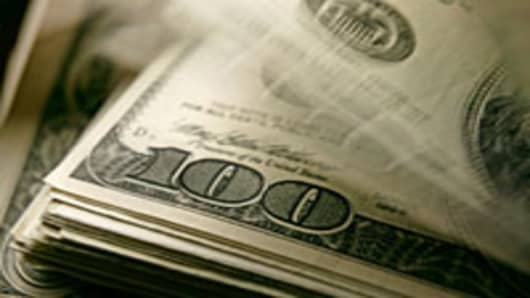With in
vestors focused more on monetary policy than economic growth, the U.S. dollar is suffering. And absent a major crisis that sends investors scurrying for safety, there may be more weakness by the end of the year, say currency strategists.
There's an awful lot of talk these days about whether the dollar has lost its appeal as a safe-haven currency, and it's true that the Swiss franc, the yen, and even the euro have fared better as unrest has spread through the Middle East. But that's not really what's ailing the dollar, says Camilla Sutton, a currency strategist at Scotiabank.
When I asked Sutton why the dollar was so weak, she had a ready answer: "It's just monetary policy front and center," she told me. "Rising oil prices are raising fears of inflation, so markets are looking at which central bank is most likely to raise rates - and that's certainly not won by the Fed."
Ironically, if the Middle East turned into more of a crisis, that might draw investors to the dollar, Sutton said - as long as the U.S. didn't get drawn into the conflict. Sutton's view is that we haven't yet reached the stage where investors are seeking real safe havens. The VIX, a widely used measure of investor expectations of volatility, now stands at 23. That's up from 16 or 17 before the Middle East turmoil began, but it's well below the 45-50 level reached even last summer, when investors were worried about a European sovereign debt crisis. A real crisis, Sutton said, does drive investors to the deepest, most liquid currency market.
So without a serious crisis, and with monetary policy in investors' sights, what's ahead for the dollar? Nothing good, Sutton says. "We're dollar bears." She believes that the dollar has fallen enough that it may move sideways for the next few months, but she anticipates further weakness by the end of the year. "I'd be a seller at this point against almost every currency," Sutton told me.
Michael Woolfolk, senior currency strategist at BNY Mellon, took a similar tack. "Right now I think the dollar's probably a bit oversold," he told me. "But it's likely to extend that as along as geopolitical events in North Africa and the Middle east remain relatively contained. Right now, investors seem to be reasonably complacent about their holdings overseas as long as they're not specifically in Africa or the Middle East, so investing in high-yielding assets in Asia and Latin America seems to be worth the risk right now."
Investors flooded into the dollar in 2008 after Lehman Brotherswent under and chaos ensued, Woolfolk pointed out. Hmm...apparently all the dollar needs to strengthen is a good old-fashioned global crisis.
CURRENCY FUTURES
Tune In: Beginning March 11th, CNBC's "Money in Motion Currency Trading" will air on Fridays at 5:30pm.
"Money in Motion Currency Trading" will repeat on Saturdays at 7pm.



